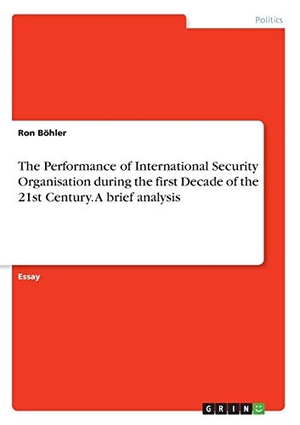Für statistische Zwecke und um bestmögliche Funktionalität zu bieten, speichert diese Website Cookies auf Ihrem Gerät. Das Speichern von Cookies kann in den Browser-Einstellungen deaktiviert werden. Wenn Sie die Website weiter nutzen, stimmen Sie der Verwendung von Cookies zu.
Cookie akzeptieren
Ron Böhler
The Performance of International Security Organisation during the first Decade of the 21st Century. A brief analysis
- GRIN Verlag
- 2017
- Taschenbuch
- 28 Seiten
- ISBN 9783668538726
Essay from the year 2011 in the subject Politics - International Politics - Topic: International Organisations, grade: 1.0, University of Bath, language: English, abstract: 'Many international organizations [IO] have clearly succeeded in formulating, and sometimes implementing, policies that cannot be described as the simple product of interstate bargaining' (Reinalda and Verbeek 1998, p.5). A closer look at international relations (IR) theories will quickly give indication that this statement is at odds with both neorealism and neoliberalism. In fact, these theories have for a long time neglected IO policy-making as well as the potential that IOs take purposive action as autonomous actors. Barnett and Finnemore hold that view and suggest a sociological perspective to treat IOs first and foremost as bureaucracies with independent agency. The International Criminal Police Organisation (ICPO),
Mehr
Weniger
zzgl. Versand
in Kürze